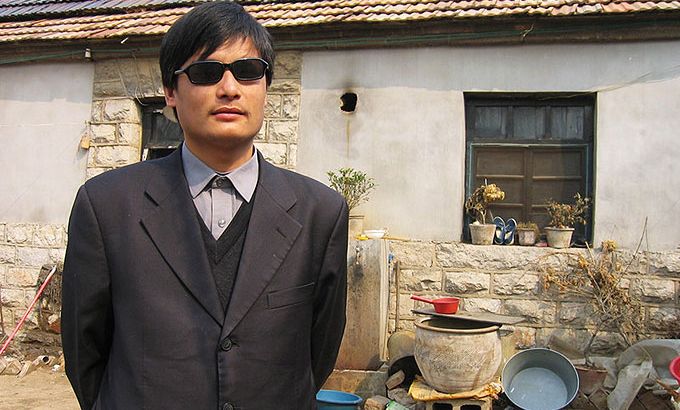Chinese activist leaves US embassy in Beijing
Beijing demands the US apologise for sheltering Chen Guangcheng in its embassy after he escaped house arrest.

Chen Guangcheng, the blind Chinese activist who was believed to have been sheltering in the US embassy in Beijing, has left the embassy to seek medical care and join his family, a US official has said.
“Chen Guangcheng has arrived at a medical facility in Beijing where he will receive medical treatment and be reunited with his family,” said a senior US official said on Wednesday.
Chen’s lawyer said the activist was “happy” and “free”.
The US official, speaking on condition of anonymity, said Chen did not ask for asylum and is staying in China after receiving assurances from the government that he would be treated as a normal citizen.
The official said that the activist was brought into the US Embassy because he was in need of medical care and that Chinese authorities promised Chen will be relocated to a safe environment where he can study at a university.
Chen has said he has received clear assurances from Chinese authorities about his safety. Speaking through his lawyers, he said he has been told he will be allowed to live with his family in a safe place in his own country.
Silence broken
Chen, a legal activist, had angered Chinese authorities by exposing forced abortions and sterilisations under the “one-child” policy.
The development comes hours after Hillary Clinton, the US secretary of state, arrived in China for key annual talks.
“I am pleased that we were able to facilitate Chen Guangcheng’s stay and departure from the US Embassy in a way
that reflected his choices and our values,” Clinton said in Beijing.
Beijing has demanded that the US apologise for sheltering Cheng in its embassy, the official Xinhua news agency said.
Liu Weimin, foreign ministry spokesman, said: “China is very unhappy over this. The US action is an interference in China’s internal affairs and China cannot accept it.”
“Chen Guangcheng, a native from Yinan County of eastern China’s Shandong Province, entered the US embassy in Beijing in late April and left of his own volition after a six-day stay in the embassy,” he said.
Both the countries have broken their silence over the issue after avoiding public comment in recent days.
House arrest
President Barack Obama on Monday dodged the issue at a Washington news conference, declining to confirm that he was under US protection in China or that American diplomats were attempting to negotiate an agreement for him to receive asylum.
“Obviously, I’m aware of the press reports on the situation in China, but I’m not going to make a statement on the issue,” the president said. “Every time we meet with China the issue of human rights comes up.”
Al Jazeera’s Harry Fawcett, reporting from Kuala Lumpur, said: “What we know that a very senior state department official, US assistant secretary of state Kurt Campbell, incharge of East Asian affairs, has been engaged in talks since Saturday,” he said.
Chen, who has been blind since childhood, has long been a high-profile figure and international rights groups have frequently expressed alarm at the treatment of him and his family.
Chen exposed how local authorities in Linyi, in Shandong province, forced thousands of women to have abortions or be sterilised as part of China’s one-child policy
He was placed under house arrest in 2010 after spending more than four years in jail for disrupting traffic and damaging property.
Chen’s colleagues said the escape from house arrest had taken months to plan, and was carried out with the help of a network of friends and activists.
He had jumped over the wall that the authorities had built around his house, he was taken to Beijing, where supporters say he stayed in safe houses before fleeing to the embassy.